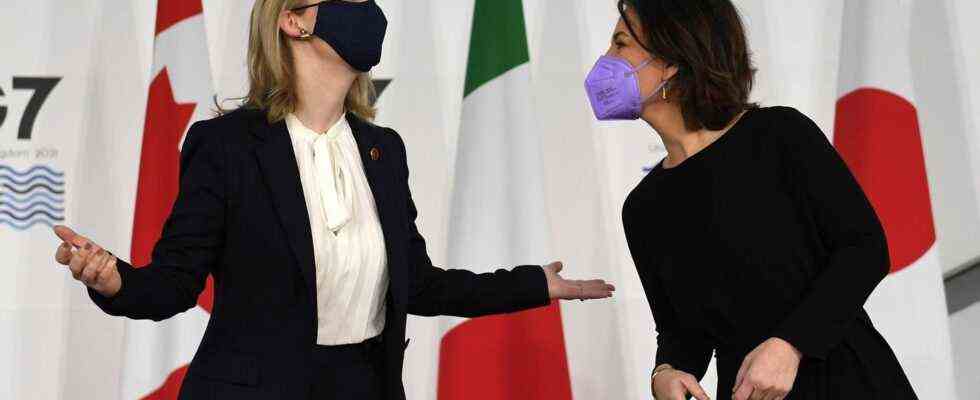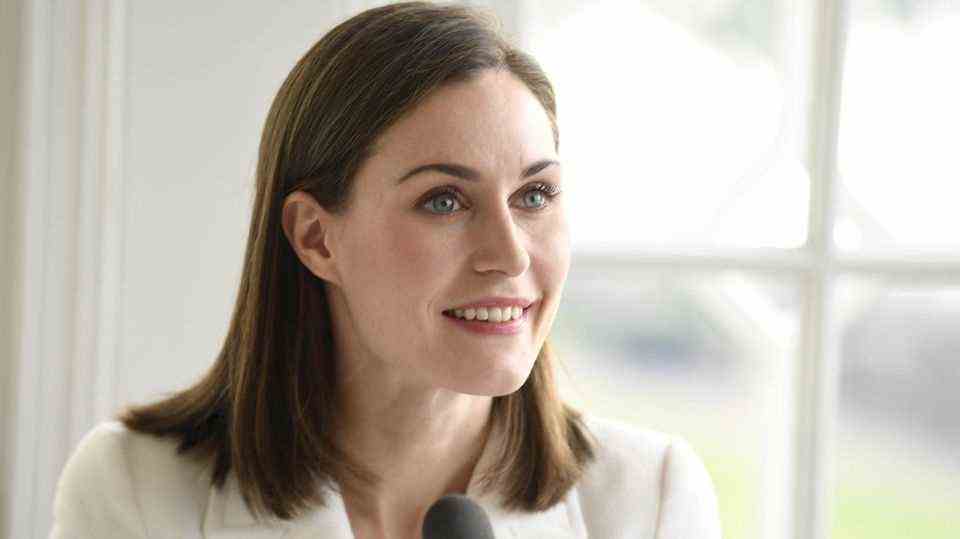Meeting in Liverpool
Baerbock and G7 Foreign Ministers: Agreement on Russia, China, Iran and an outlook on their own presidency
The British Foreign Secretary Liz Truss (l.) Welcomes Annalena Baerbock in Liverpool
© Olivier Douliery / AFP
It is the first appearance on a major international stage for the new German Foreign Minister Annalena Baerbock. Right from the start, she can announce agreement on the most important crisis issues.
According to Foreign Minister Annalena Baerbock, the foreign ministers of the leading western economies have agreed on common principles towards Russia, China and Iran. The G7 states agreed that there could be no border shift in Europe, said the Green politician on Saturday after consultations with her colleagues in Liverpool. It is a clear common position “that crossing this limit would have enormous political and economic consequences”.
The G7 act as a group “that doesn’t work against someone, but stands up for something,” emphasized Baerbock. The cooperation is based on the common understanding of a global economy that is based on the values of democracy, the rule of law and human rights and is interested in fair world trade and fair cooperation. At the turn of the year, Germany will take over from Great Britain as chairman of the G7, which includes France and the USA, Italy, Japan and Canada.
Extensive discussions about Iran
There was unanimous agreement in the round that China “is a partner in all the global issues that concern us around the world, but also competitors and system rivals,” said Baerbock. One wants to achieve cooperation with China under fair conditions and above all with respect for human rights.
In view of the faltering nuclear talks with Iran in Vienna, Baerbock said the Iranians’ offer meant falling behind in the negotiations by six months. Iran has lost a lot of trust. Nevertheless, a diplomatic solution is being worked on at full speed. In Liverpool, however, the demand that Iran act and return to the old negotiating status had also become clear. The negotiations in Vienna are “not an end in themselves, but prevent Iran from getting the resources and know-how to build an atomic bomb”. The Green politician emphasized: “We are running out of time at this point.”
With regard to Russia and the Ukraine crisis, Baerbock said that the G7 meeting should send the signal “that we are clearly committed to multilateralism and, above all, to international law”. That also means taking all measures to be able to return to dialogue despite the tense situation. She named the Normandy format between Germany, France, Ukraine and Russia and the Organization for Security and Cooperation in Europe (OSCE) as possible negotiation platforms. The goal is de-escalation on the Russian-Ukrainian border.
Baerbock wants to link the climate crisis and security policy
Great Britain and the US remained concerned about Russian military movements in the border area with Ukraine. During a conversation before the G7 meeting, British Foreign Minister Liz Truss and her US counterpart Antony Blinken agreed on their support for Ukraine, said a British Foreign Office spokesman. Any invasion by Russia would be a strategic mistake with serious consequences.
According to Baerbock, the group also presented the priorities for the foreign policy part of the German G7 presidency. The first point she mentioned was the link between the climate crisis and security policy. Climate change is a strong driver of conflicts around the world. In addition, Germany wants to strengthen forward-looking multilateralism so that international action does not only take place when crises are already there. She cited the corona pandemic as an example. During the G7 presidency, Germany also wants to work to make democracies more resilient, for example against cyber attacks or other attacks.
Baerbock met her Italian counterpart Luigi Di Maio and the Japanese Foreign Minister Yoshimasa Hayashi in Liverpool to get to know each other. On Sunday afternoon, she wanted to travel to Brussels to meet with EU Commission President Ursula von der Leyen.
Worldwide distribution of the corona vaccines
The foreign ministers also wanted to discuss the global distribution of corona vaccines in Liverpool, partly together with the G7 development ministers. The new head of department Svenja Schulze (SPD) wanted to travel from Germany. As the richest countries on earth, the G7 have “a special responsibility in dealing with the corona pandemic and climate change, and they must show global solidarity with the poorest,” she urged before their talks. In the long term, only fair global vaccine distribution will help against the corona pandemic.



